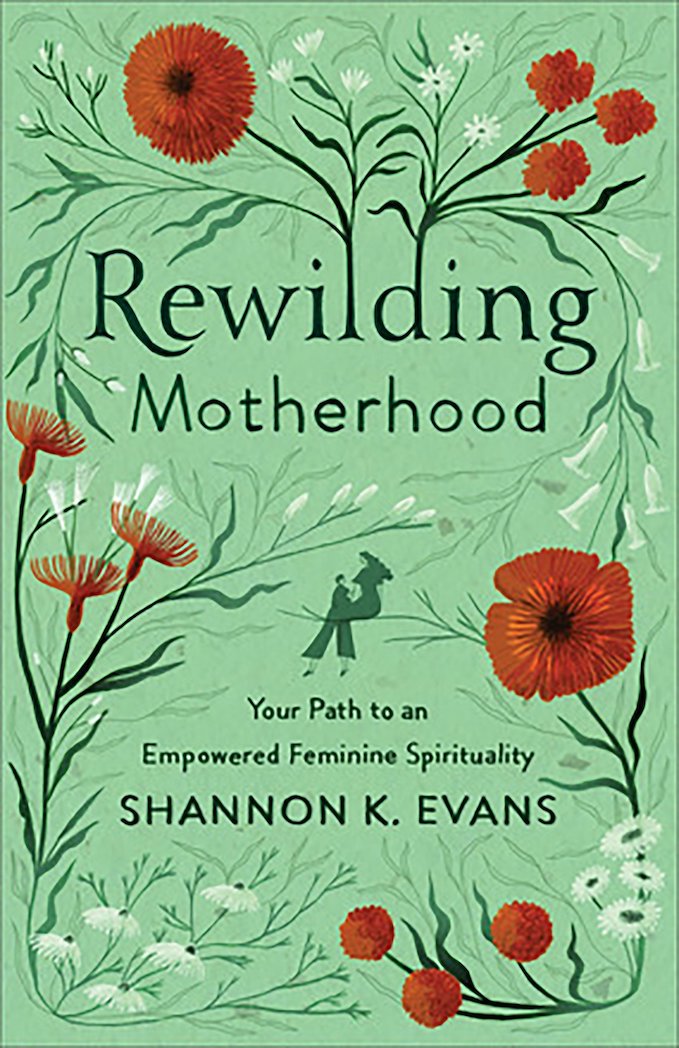“Rewilding Motherhood: Your Path to an Empowered Feminine Spirituality” by Shannon K. Evans. Brazos Press (Grand Rapids, Michigan, 2021). 165 pp., $16.99.
Looking for a Mother’s Day gift for a progressive mom? “Rewilding Motherhood: Your Path to an Empowered Feminine Spirituality” will appeal to mothers looking to recharge their spiritual life from a fresh, edgy perspective.
Shannon K. Evans is a mother of five children, a columnist at Jesuits.org and social media editor at National Catholic Reporter. She is also author of another book, “Embracing Weakness.”
While Evans draws from Catholic spirituality and shares parts of her journey to the Catholic Church, readers of any faith will glean much wisdom from “Rewilding Motherhood.”
Rewilding refers to a conservation effort that aims to restore ecosystems back to their healthy, natural state without human intervention. Evans seeks to take the concept and apply it to motherhood to “return us back to our original state as image bearers of an untamed God.”
The first half of the book focuses on growing interiorly – discussing topics such as forging identity, maintaining boundaries and following anger – while the second half of the book concentrates on “flowing outward” – considering topics such as embodying hospitality, valuing work and becoming acquainted with the feminine aspects of God.
Each chapter concludes with a call to go deeper, with questions for further reflection or suggestions for activities to take on, like journaling, going for a walk in nature, praying the Examen or even relaxing in a bath.
That mothers could be “totally fulfilled” in their identity as mothers is a myth, Evans says at the forefront, and that includes women who are mothers through childbirth, adoption, foster care, step-parenting and more.
“My sons and daughter make my life more meaningful, but they do not exist to give my life meaning,” she writes. “Motherhood does not tell us who we are; motherhood tells us how to find out for ourselves.”
In a chapter about reclaiming solitude, Evans notes that mothers often feel isolated and lonely. Friendships with other moms won’t fill that void, she argues: “There is no external relationship that can replace a woman’s relationship with herself – the one companion she is guaranteed to have every day of her life.” Explore your passions and interests; fall in love with the woman you are.
Evans also takes aim at barriers, stereotypes and social conditions women face. Women are conditioned to repress anger, lest they be “deemed unhinged,” Evans says. Their anger is only justifiable when it is for the sake of others. Rather than quell any feelings of anger, examine what might be their root cause and discover which of your needs may be unmet, she advises.
More traditionally minded readers may feel uncomfortable or challenged by some of Evans’ theology, particularly in the final chapter on “reimagining God.” There Evans laments the use of primarily male-dominated language and imagery when describing God in Christianity and other major religions.
“If God is neither male nor female, and yet we routinely image God as male, then logic only follows that it would also be permissible to image God as female,” she states.
Evans argues that just as visual depictions of Mary like Our Lady of Guadalupe in Mexico and Our Lady of Kibeho in Rwanda have sustained Catholics of color around the world, so too would a maternal imagining of God benefit the spiritual lives of women and men who might discover as a result they “have an easier time internalizing compassion, inclusivity, radical acceptance, justice for the outcast and unconditional love.”
Some readers may be surprised to learn that Pope John Paul I said God “is a father, but even more, a mother,” to a crowd in St. Peter’s Square, Sept. 10, 1978. He used the example of children being loved more by their mother when they are sick.
Pope Benedict XVI takes up the question of calling God mother in his book “Jesus of Nazareth.” He acknowledges that Scripture compares God’s love with the love of a mother, such as in the Book of Isaiah: “As a mother comforts her children, so I will comfort you” (66:13). But God is not addressed specifically as mother in the Old or New Testament, Pope Benedict says.
This is a fascinating and worthy topic – one that readers should continue to explore after reading “Rewilding Motherhood.”
Also of interest: “Motherhood: An Extraordinary Vocation” by Kathryn Rombs. Our Sunday Visitor (Huntington, Indiana, 2021). 192 pp., $16.95.
“The Ave Maria Prayer Book for Catholic Mothers,” edited by Heidi Hess Saxton. Ave Maria Press (Notre Dame, Indiana, 2021). 224 PP., $21.95.
“Beyond Biology: Rethinking Parenthood in the Catholic Tradition” by Jacob M. Kohlhaas. Georgetown University Press (Washington, 2021). 278 pp., $49.95.

